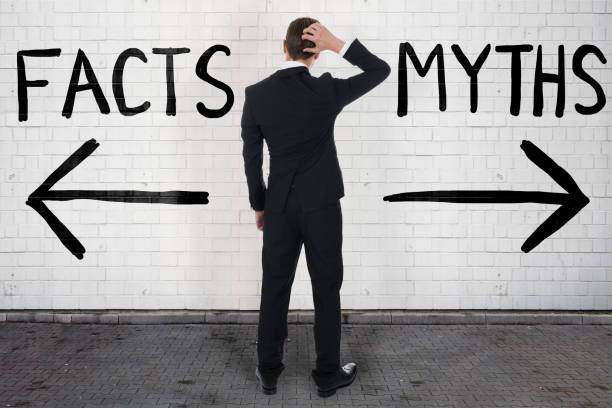Busting The Myths About Selling Your Property
Myths and misconceptions abound regarding the real estate market. You can read them online and hear them at work. Likewise, they are regularly shared around the family barbecue. Well-meaning friends and relatives might chime in with suggestions and help propagate them. They don’t mean any harm; they don’t know any better. After all, that’s the nature of myths and misconceptions. However, if you afford these fallacies too much credence, they might affect how you sell your property. Worse yet, they can potentially lose you buyers or result in a poor sale. If you’re selling your property for the first time, it’s prudent to be aware of these myths and misconceptions. We’ve collected the most common of these and run them past real estate experts. With their help, we shine a light on the reality vs. myths about selling your property. Their advice may come as a surprise to many.
Pricing Your Property Too High Or Too Low
There is a dual fallacy around listing the price of your house. The idea that intentionally pricing your property low will result in a higher offer during negotiations will lead to regret. Firstly, it will attract the wrong type of buyer. Secondly, you might find yourself nailed to that price if it all goes pear-shaped. But you might even scare off a committed buyer who senses something may be wrong with the property. If they’re looking at similar properties that are better located but marginally pricier, you’ll be shooting yourself in the foot. However, if you list your price too high at the outset, you’re also setting yourself up for failure. You’re almost certain to alienate buyers rather than engage them in a cunning strategy of negotiation. It’s better to price your property according to similar houses in your area. Use the market average as your guide.
There Are Good And Bad Times Of The Year To Sell Your Property
Seasons have changed over time. Summer lasts longer, and winter seems shorter, but it’s cooler during the traditionally warmer months. It’s often believed that the market cycle is dependent on the weather. However, it’s a matter of supply and demand. While it’s true that better weather attracts buyers, you can’t rely on it as gospel. Likewise, you can’t rely on the notion that sellers time the sale of their property according to traditional holiday seasons. At the end of the year, there will indeed be more properties on the market. However, more stock doesn’t translate to more buyers. The best time to enter the market is when there is less competition, so it pays to study the trends. Keep abreast of what’s happening in your area. If houses are selling, then don’t wait. Therefore, the seasons do influence when people buy. But overall, buyers are motivated by various factors.
You Don’t Need To Home Stage To Sell Your Property
If you’re looking to find savings when selling your property, be sure you don’t make a dreadful mistake instead. Cutting corners might not create savings but result in a significant loss. For instance, many believe they can sell their property without home staging. They might be persuaded that people don’t need to be guided by home decorating techniques. According to seasoned real estate agents, this is a dangerous misapprehension. The top agents rate home staging as integral to finding a buyer. Relying on potential buyers to have a good enough imagination to see through an empty room isn’t recommended. Buyers must relate to the houses they walk through. They need to feel comfortable living there. Furniture and décor go a long way toward accentuating the vibe of a room. The best features of a house often come to light when they’ve been highlighted by a decorator with a keen eye.
Advertising Online Is Enough To Sell Your Property
We are very much living in the digital age. The new technologies control our lives. We don’t have to visit banks to transact our finances. If we’re feeling too lazy to cook, we don’t need to drive to the takeaway. Hell, we needn’t even pick up the phone. It’s all online. Everything we might want to purchase is waiting at the tips of our fingers. Therefore, it’s easy to suppose that you only require a decent picture on realestate.com to sell your property. However, once again, you’d be wrong. Every real estate agent worth their salt recommends paying for a comprehensive marketing campaign. You’re trying to bring in as many potential buyers as possible. This means erecting the “for sale” sign in your front yard and distributing open-inspection brochures. Similarly, you’re covering all bases by advertising in the property listings of national publications. You must cast the widest net possible.
You Should Always Reject The First Offer
Newer listings usually get more attention, especially during the first week the house is on the market. Many sellers assume that it’s smarter to wait and see what other offers come their way rather than accept the first. This can lead to the property waiting on the listing for a long time, and you don’t want that. The longer a property sits on the market, the greater the chance buyers will think something’s wrong with it. If you and your agent have done your research, you’ll have priced your house strategically. You won’t price it too high or too low. Therefore, unless the first buyer is offering substantially less than the asking price, you should seriously consider their offer. It’s a matter of correcting your mindset. After all, the first offer you receive may be the best anyway. Why change the art of sales into a risky competition?
The House Interior Is All That Matters
It is foolish to believe that the inside of the house is all that matters to a potential buyer. Don’t invest all your efforts in the interior and avoid the exterior of the dwelling! The property’s façade and its exterior are every bit as important as what’s indoors. This is why agents will encourage sellers to improve their property’s kerb appeal. This describes the house’s appearance to a prospective buyer approaching from the street. What greets a person as they come near your house is as necessary as how well it is presented inside. A potential buyer’s approval should be understandable to you; after all, would you want to live in a goat’s shed? The garden, fence, driveway, and every visible part of the house count! Good homeowners take pride not just in how their house appears to them but in the general neighbourhood.
You Don’t Need An Agent To Sell Your Property
Plenty of DIY sites out there lure punters by promising huge savings on agents’ fees. Theirs is the ultimate expression of “advertising online is enough.” Anyone selling their home is amenable to saving on whatever costs they can. But the idea that you can sell your property better without a qualified real estate agent is the biggest myth around. A website won’t arrange home staging or offer local contacts for services such as cleaning and repairs. Moreover, they don’t have the personalised and local knowledge an agent brings. But the one thing they certainly can’t offer is access to the real estate agency’s database. Agencies can use a network of contacts as well as their database to reach potential buyers. And the greatest skill an agent offers is their power of negotiation. particularly if they’re able to create a bidding war on your property. A website can’t do all that.
Conclusion
Everyone wants to save whatever they can on the sale of their property. It stands to reason. However, this desire can prove to be counterintuitive. Cutting corners on things like home staging or minor repairs won’t save you money. No, it’s more likely to cost you, and more than you think. A lot of myths and misconceptions are floating about, and the trick is not to be beguiled by them. It’s not a good idea to take advice from friends and relatives, or even Barney, your drinking buddy. Everyone will offer their input, but people aren’t as clever as they like to think. The only advice you heed should come from a qualified real estate professional. If you are selling your property and need expert advice, contact Perfect Agent. We will introduce you to your perfect agent free of charge.




